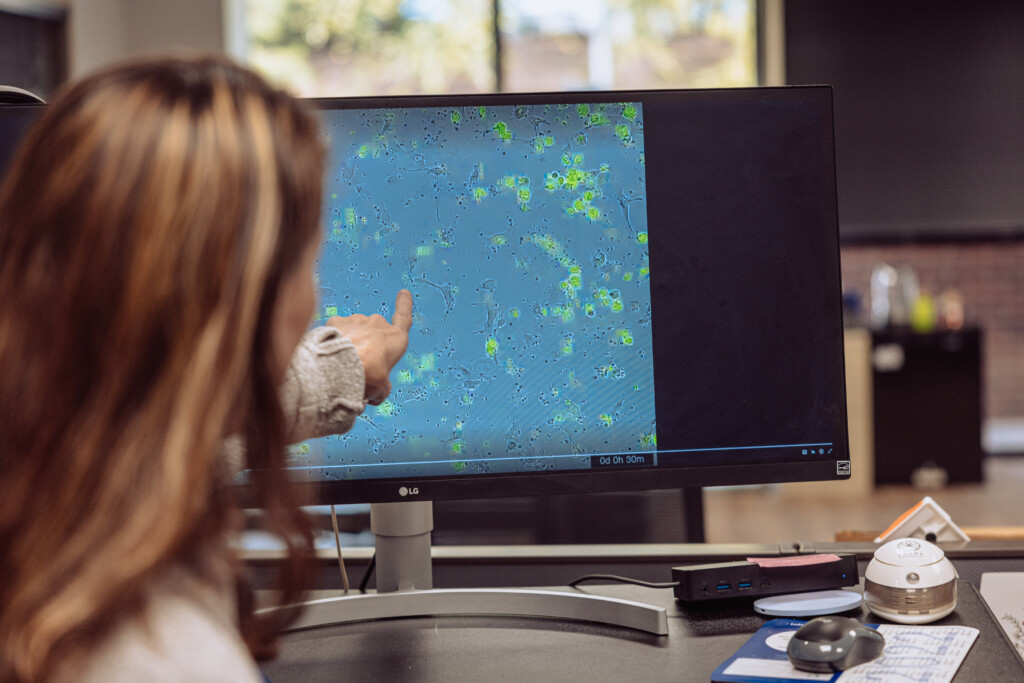How Tomorrow’s Big Cancer Breakthroughs Start in Huntersville Today
In Partnership With Carolina BioOncology Institute

Inside a brick building in Huntersville, doctors and researchers advance some of the most exciting cancer research in the country. On the outside of this building, however, is a name you might not recognize: Carolina BioOncology Institute. While it doesn’t bear the name of a major hospital system, its small size and independence have made it one of the most nimble and efficient phase-one clinical trial centers.
For nearly two decades, people throughout the region have come here to become the first in the world to get access to immunotherapy treatments that are revolutionizing cancer care. Patients meet with clinicians who match them to clinical trials for cancers of the lung, skin, breast, colon, pancreas, and other solid tumor types – without having to travel to major hospitals in big cities.
Carolina BioOncology Institute offers about 25 different clinical trials at a time. The cancer treatments in the headlines today were first used there years ago, while the breakthrough treatments of tomorrow are available there today.
“All of those cancer drugs you see during N.F.L. Super Bowl ads are the same drugs that we did the first dose on 10, 15, up to 19 years ago,” says oncologist Dr. John Powderly, the founder and president of Carolina BioOncology Institute.
***
When Carolina BioOncology Institute opened in 2005, cancer care in Charlotte was very a different landscape. Dr. Powderly saw great potential in an emerging treatment—immunotherapy—and wanted to devote a center to advancing its research. Locating a phase-one clinical trial center in Charlotte, which has been the largest city in the country to lack a medical school, filled a void in patient care.
Charlotte was the right place to open a research center devoted to immunotherapy of solid tumors. Immunotherapy is especially effective in attacking tumors that mutate quickly, especially tumors of the skin and lung. Here, in the Sun Belt on former tobacco land, these cancers have been prevalent. Clinical trials at Carolina BioOncology Institute have given patients the treatments they need to fight they cancers they have.
 Thanks to those immunotherapy clinical trials, lung and skin cancer treatments have seen incredible progress since then, and many of those immunotherapy drugs are now FDA-approved standard therapies. Today, a new cancer threat has emerged. Colorectal cancer—which includes both colon and rectal cancer—is increasingly common in younger patients. Due to postponed cancer screenings during the pandemic, oncologists are seeing patients who are first diagnosed with colorectal cancer after its progressed to advanced stages. Finding effective immunotherapy treatments for metastatic colorectal cancer is a major mission within the walls of Carolina BioOncology Institute.
Thanks to those immunotherapy clinical trials, lung and skin cancer treatments have seen incredible progress since then, and many of those immunotherapy drugs are now FDA-approved standard therapies. Today, a new cancer threat has emerged. Colorectal cancer—which includes both colon and rectal cancer—is increasingly common in younger patients. Due to postponed cancer screenings during the pandemic, oncologists are seeing patients who are first diagnosed with colorectal cancer after its progressed to advanced stages. Finding effective immunotherapy treatments for metastatic colorectal cancer is a major mission within the walls of Carolina BioOncology Institute.
“Earlier versions of immunotherapy didn’t work well for colon cancer, but now we’re learning how colon cancer hides from the immune system through other pathways,” Dr. Powderly says. “We’re getting some early success figuring out other systems of immunotherapy drugs, which is good news.”
***
 Just as tumors mutate with time, cancer trends do as well, with different types and stages of tumors becoming more prevalent. As they do, Carolina BioOncology Institute has the quick-moving processes to bring the trials patients need, when they need them. Its team of PhDs, clinicians, biomedical engineers, certified clinical researchers, and more collaborate quickly without the bureaucratic restraints of larger institutions. Whereas major hospitals can take months to enroll a patient into a clinical trial, it takes days or weeks here. Whereas one nurse at a hospital usually assists several patients at once, here, a “one nurse/one patient” rule creates close bonds between providers and patients.
Just as tumors mutate with time, cancer trends do as well, with different types and stages of tumors becoming more prevalent. As they do, Carolina BioOncology Institute has the quick-moving processes to bring the trials patients need, when they need them. Its team of PhDs, clinicians, biomedical engineers, certified clinical researchers, and more collaborate quickly without the bureaucratic restraints of larger institutions. Whereas major hospitals can take months to enroll a patient into a clinical trial, it takes days or weeks here. Whereas one nurse at a hospital usually assists several patients at once, here, a “one nurse/one patient” rule creates close bonds between providers and patients.
“There’s a big need right now for phase one clinical trial centers that are efficient, and we get the trophy for that,” Dr. Powderly says. “The hospital systems are like aircraft carriers, and we operate like special ops. It’s that immediate.”
Discover more about Carolina BioOncology Institute here.







